Ted Honderich is the author of Philosopher: A Kind of Life and has been Grote Professor of Mind and Logic at University College London. His other publications include A Theory of Determinism: The Mind, Neuroscience and Life-Hopes, journal articles in the Philosophy of Mind, and also the books Violence for Equality: Inquiries in Political Philosophy and Conservatism. He is the editor of The Oxford Companion to Philosophy and of several series of philosophy books, including The Arguments of the Philosophers. The first edition of How Free Are You? was translated into seven languages.
TED HONDERICH





To Ingrid
Since this is a book, it must contain obscurities and mistakes. There are fewer of them because of suggestions made by Richard Double, James Garvey, Anthony Grayling, Angela Griffin, Scott Hagan, Germund Hesslow, Basil Hiley, John Honderich, Kevin Magill, Paul Noordhof, Jane O'Grady, Ingrid Coggin Purkiss, Sarah Richmond, Michael Scott, Galen Strawson, Ruediger Vaas, Pat Walsh, and Roy Weatherford. My warm thanks to them.
... 142
 xis book is about a problem that will get a hold on you. It will, anyway, if philosophers past and present are any guide. The greatest of them, as well as the not-so-great, have struggled with it. Some have been upset by it, some have sided with predecessors, some have tried to reduce it to science, some have announced brazen solutions. The problem is determinism. That is, the question of whether your choosing this book and your reading this sentence now, or your deciding to move in with someone or get divorced, is just a matter of cause and effect.
xis book is about a problem that will get a hold on you. It will, anyway, if philosophers past and present are any guide. The greatest of them, as well as the not-so-great, have struggled with it. Some have been upset by it, some have sided with predecessors, some have tried to reduce it to science, some have announced brazen solutions. The problem is determinism. That is, the question of whether your choosing this book and your reading this sentence now, or your deciding to move in with someone or get divorced, is just a matter of cause and effect.
There are so-called theories that come to nothing much, or anyway not enough. Some of them are outside of ordinary science and philosophy and outside of the universities, but a lot of them are inside. For example, there are philosophical theories by scientists, some of them about the subject of consciousness, that as philosophy seem hardly worth the paper they're printed on.
Theories may be talked and written about, taken on trust, have a great success. They may even last. But they are not clear, consistent, and worked-out. In short, they aren't conceptually adequate. When you really try to get a hold on them, they turn out to be obscure, or they do not hang together, or they are undeveloped. They are failures even before you try to test them to see if they're true.
Is the theory of determinism like that?
It has been around long enough, and most of us have some idea of what it is. Its supposed upshot is that we are not free in anything we choose or do, and aren't to be held morally responsible for our actions or given moral credit for them. Determinism presumably goes against the special idea or kind of freedom that is still called Free Will. That is something we do feel we've got, and would be alarmed to lose. Ifwe find ourselves in front of a judge, we may be told firmly that we had Free Will when we chose to commit the offence. He may not use the archaic term, but we will get the idea anyway.
According to this idea, each of us has a kind of personal power to originate choices and decisions and thus actions. Their coming-about or initiation definitely wasn't just a matter of cause and effect. Thus on a given occasion, with the past just as it was and the present and ourselves just as they are, we can choose or decide the opposite of what we actually do choose or decide. We can go on to act differently from the way we actually do.
There is reason for as much or more suspicion about this theory. Is it respectable? Does it give us what deserves the name of being a philosophy of mind and action? Is it made respectable by what it usually includes, an interpretation of the troubled part of physics that is Quantum Theory?
To get these opening chapters into better view, a couple of distinctions are needed. The term `determinism' is used in different ways by philosophers and others. It is traditionally used as the name of a very general theory about all of reality, including the non-living world and in particular the small particles of physics. Sometimes this general theory is contemplated or worked out in terms of mathematical equations. It then amounts to determinism in terms of physics.
But determinism is also ordinarily taken as an idea, doctrine, or theory about persons, one that is non-mathematical and includes in itself the proposition that somehow we aren't free and responsible. We have a certain nature or human nature and as a result of this we aren't free and responsible.

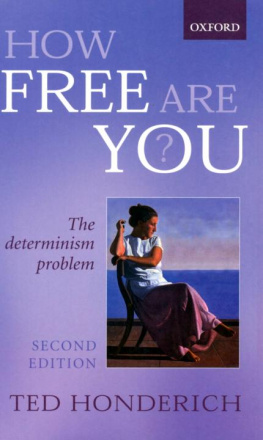

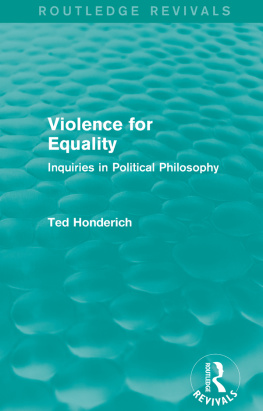
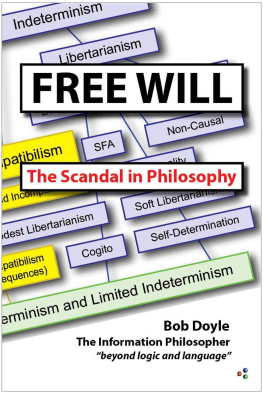
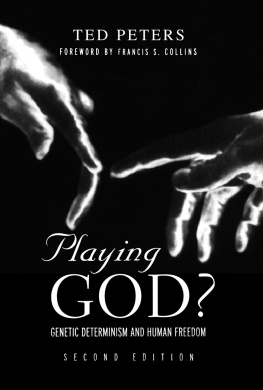
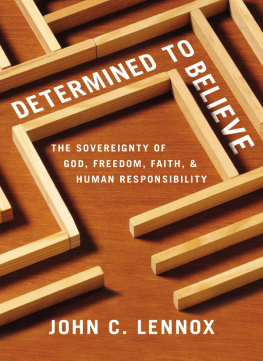
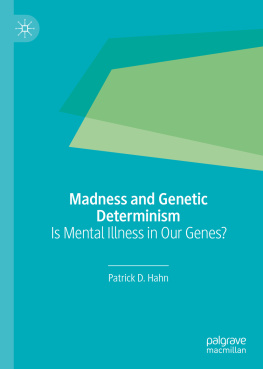
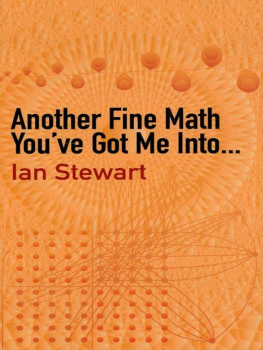
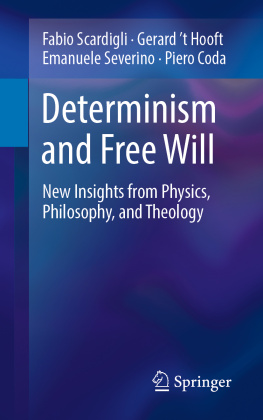
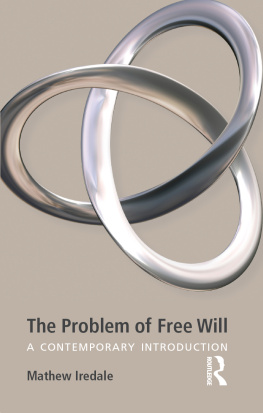
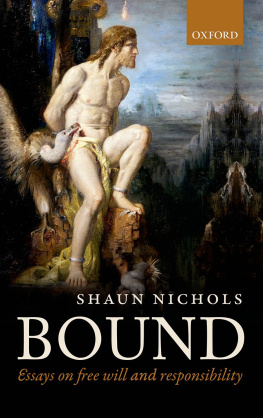











 xis book is about a problem that will get a hold on you. It will, anyway, if philosophers past and present are any guide. The greatest of them, as well as the not-so-great, have struggled with it. Some have been upset by it, some have sided with predecessors, some have tried to reduce it to science, some have announced brazen solutions. The problem is determinism. That is, the question of whether your choosing this book and your reading this sentence now, or your deciding to move in with someone or get divorced, is just a matter of cause and effect.
xis book is about a problem that will get a hold on you. It will, anyway, if philosophers past and present are any guide. The greatest of them, as well as the not-so-great, have struggled with it. Some have been upset by it, some have sided with predecessors, some have tried to reduce it to science, some have announced brazen solutions. The problem is determinism. That is, the question of whether your choosing this book and your reading this sentence now, or your deciding to move in with someone or get divorced, is just a matter of cause and effect.